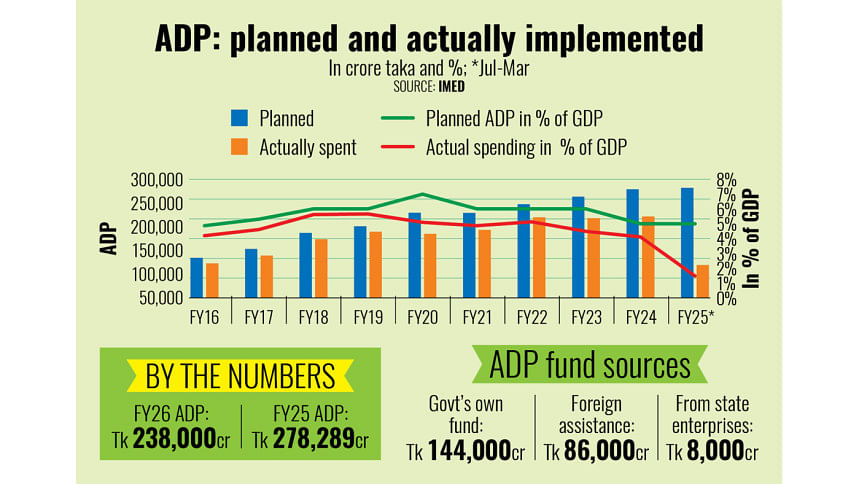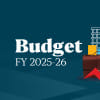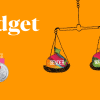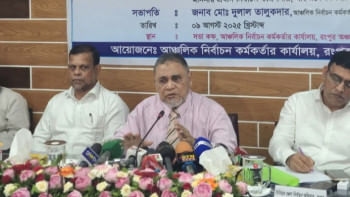Dev budget for FY26 lowest in four years

The interim government is set to slash the development budget for the fiscal year (FY) 2025-26 by 14 percent year-on-year, as it struggles with limited fiscal space and steers away from costly mega-projects.
The Annual Development Programme (ADP) is likely to stand at Tk 238,000 crore for FY26, down from Tk 278,289 crore in the current fiscal year -- making it the lowest in the past four years, according to planning ministry sources.
The proposed allocation was discussed at an extended meeting of the planning ministry yesterday, chaired by Planning Adviser Wahiduddin Mahmud. The National Economic Council (NEC) is scheduled to approve the development budget on May 18.
Of the total allocation, Tk 144,000 crore is to be funded from domestic resources. Foreign assistance is projected to contribute Tk 86,000 crore, while state-owned enterprises (SOEs) will provide Tk 8,000 crore for their own development schemes.
This marks a massive fall from the Tk 13,289 crore development expenditure by SOEs in the current fiscal year.
Analysts say the sharp cut in development spending reflects growing concerns over weak revenue collection, the urgent need for fiscal discipline ahead of the national budget, and an overall poor utilisation of existing funds.
In the first nine months of FY25, ADP implementation stood at just 36.65 percent, the lowest in at least 15 years.
Economists have broadly welcomed the proposed reduction, calling it a "pragmatic approach" under the current circumstances.
In the next national budget, they called for expanded social protection and better use of limited resources.
Fahmida Khatun, executive director of local think tank Centre for Policy Dialogue (CPD), said, "The trimming of development spending is due mainly to the government's limited fiscal space."
"But another reason is that several large projects were undertaken previously based on political considerations, many of which were expensive and not expected to yield quick returns," she commented.
"Given the current macroeconomic indicators, we should aim for a low-growth, low-inflation path to stabilise the economy. To reduce inflation, we must cut expenditure, but that will also lower growth and employment," said Khatun.
According to the economist, a balance among inflation, growth, and employment is essential. "We need to manage expectations. Trying to aggressively improve one indicator might worsen another. We have to avoid such conflicts."
Ashikur Rahman, principal economist at the Policy Research Institute (PRI) of Bangladesh, echoed similar sentiments.
"I don't think there's any need to set an unrealistically high ADP target this time amid uncertainty about IMF budget support," he said.
"Instead, we need to focus on fiscal discipline, emphasise revenue growth, and prioritise investments in key sectors."
He pointed to the long-standing gap between revenue generation and development targets.
"If you look at revenue mobilisation over the last 15 years alongside ADP implementation, you'll see that our revenue growth has been quite conservative. Even now, it's being said that the NBR will miss its target."
"Overall, if the government manages to implement an ADP worth Tk 2 lakh crore this year, I would say that's a decent achievement. Because if they can get close to that number, given the current ADP presentation, the actual implementation will likely be around 15 percent less than the target."
"Social protection should be prioritised in the next budget," said Rahman, "especially since many union parishads are dysfunctional and allocations have been suspended, putting added pressure on poor and near-poor communities."
"Within the allocation, we must prioritise marginalised populations and focus on low-hanging or high-priority projects.
"This year's budget doesn't leave much room for flexibility. The fiscal situation is extremely tight and requires strong economic management," he said.


 For all latest news, follow The Daily Star's Google News channel.
For all latest news, follow The Daily Star's Google News channel. 








Comments